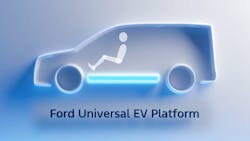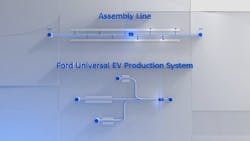Ford to Invest $2 Billion for Louisville Electric Trucks
Ford, the company that invented the moving automotive assembly line, is rethinking how it will make future vehicles, announcing plans to invest $5 billion in Louisville, Kentucky, and Marshall, Michigan, for its next generation of electric trucks.
“We have all lived through far too many ‘good college tries’ by Detroit automakers to make affordable vehicles that ends up with idled plants, layoffs and uncertainty,” Ford President and CEO Jim Farley said. “So, this had to be a strong, sustainable and profitable business. From Day 1, we knew there was no incremental path to success. We empowered a tiny skunkworks team three time zones away from Detroit. We tore up the moving assembly line concept and designed a better one.”
Louisville Assembly Plant, now home to the Escape small crossover, will get $2 billion of the investment for what Ford is calling a modular family of future EVs (the company already announced the $3 billion battery plant). Powered by low-cost but lower-range lithium-iron-phosphate (LFP) batteries, Ford officials say the new vehicles will use dramatically fewer parts and take less assembly time than internal combustion engine options. Targets include:
- 20% fewer parts
- 25% fewer fasteners
- 40% fewer workstations
- 15% faster assembly time
Rather than a straight assembly line, Bryce Currie, Ford vice president, Americas Manufacturing, says the new system will be more like a tree – three separate production processes that come together for final assembly.
“We put our employees at the center and re-created the factory from scratch,” Currie said. “We live and breathe continuous improvement, but sometimes you need a dramatic leap forward. We expect ergonomic breakthroughs and complexity reduction – through elimination of parts, connectors and wire – will flow through to significant quality and cost wins.”
The Louisville plant will initially build a mid-sized electric pickup, but Ford officials say the new electric architecture will be modular and able to support lots of different vehicle types.
About the Author
Robert Schoenberger
Editor-in-Chief
LinkedIn: linkedin.com/in/robert-schoenberger-4326b810
Bio: Robert Schoenberger has been writing about manufacturing technology in one form or another since the late 1990s. He began his career in newspapers in South Texas and has worked for The Clarion-Ledger in Jackson, Mississippi; The Courier-Journal in Louisville, Kentucky; and The Plain Dealer in Cleveland where he spent more than six years as the automotive reporter. In 2014, he launched Today's Motor Vehicles (now EV Manufacturing & Design), a magazine focusing on design and manufacturing topics within the automotive and commercial truck worlds. He joined IndustryWeek in late 2021.


